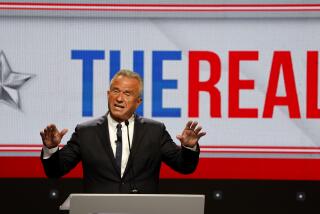Independents Hear the Trumpet : More substance, less pap in the ’96 campaign?
- Share via
Bill Bradley has decided to call it quits next year after serving three terms as a Democratic senator from New Jersey, but rather than abandoning politics he’s thinking about running for President as an independent. Ross Perot, the Texas billionaire, has by no means shut the door on another try for the presidency himself; in 1992 he won nearly 20 million votes, almost 19% of the total, after a quirky in-and-out and then back-in-again campaign. The Rev. Jesse Jackson indicates he might run again as an independent if he’s unhappy about where the Democratic Party is headed. Ditto Pat Buchanan if he can’t get the Republican nomination and doesn’t much like the candidate who does. And of course Colin Powell, party affiliation unknown, plans unclear, is on everyone’s list as a potential candidate.
POLITICAL VOID: To be sure, talk is cheap and running a credible race for President is discouragingly expensive. In ordinary times the prospects of not just one but even two or three well-supported candidates running as independents would have little credence. But these aren’t ordinary times.
As Bradley said the other day, summing up what many Americans feel, the major political parties are no longer perceived as speaking to people “where they live their lives.” That feeling defines a large and apparently growing void in our political culture. The underlying sense that, however venal some politicians might be, the system itself ultimately works and can be trusted has broken down. Thus opportunities have opened for independent candidates unconnected with what many see as the failures and self-serving missions of the major parties.
STABILITY AT RISK: There is of course nothing sacred about the two-party system. The chief virtues of the system are that it forces the major parties to be fairly broad-based, which helps keep extremism in check, and that it assures a winning presidential candidate will be the choice of a clear majority or at least a near-majority. In short, the system fosters political stability. But when the political process is seen as increasingly unresponsive to real needs, when it leaves not just the ideological extremes but large constituencies of ordinary voters feeling frustrated and betrayed, then the stability argument begins to fall apart. That’s when the field invites independent candidates.
The best thing about having independents running for President is they have the freedom--and often the courage--to talk about things the major-party candidates won’t talk about. Much of what an independent says might of course be extremist nonsense, but if a political centrist or two in fact runs next year--say a Bradley or a Powell--there might just be a chance the electorate will hear some ideas better than the sound-bite pap we have become used to. Anything that raises the level of political discourse in our democracy would be warmly welcomed.
More to Read
Get the L.A. Times Politics newsletter
Deeply reported insights into legislation, politics and policy from Sacramento, Washington and beyond. In your inbox twice per week.
You may occasionally receive promotional content from the Los Angeles Times.










